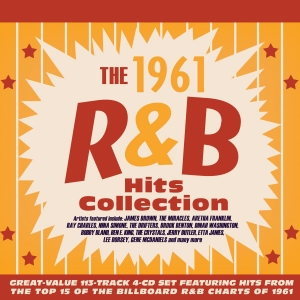 Before The Beatles and the British invasion, before Motown and disco, both black and white audiences were united by a love of rhythm and blues. Sounds from Memphis and New Orleans dominated the airwaves, with artists and “name” groups mixed blues, hard bop and doo wop to create a sound that is possibly the last time Americans listened to music that was happy, as in just a couple of years President Kennedy would be assassinated, the Vietnam War would escalate, and everyone would be protesting against something.
Before The Beatles and the British invasion, before Motown and disco, both black and white audiences were united by a love of rhythm and blues. Sounds from Memphis and New Orleans dominated the airwaves, with artists and “name” groups mixed blues, hard bop and doo wop to create a sound that is possibly the last time Americans listened to music that was happy, as in just a couple of years President Kennedy would be assassinated, the Vietnam War would escalate, and everyone would be protesting against something.
But don’t think that this four disc, 114 song collection is an indulgence in nostalgia. Quite the contrary, it is an Ebenezer to show how far popular music could go in mixing sounds palatable to the masses, yet still thrill the staunches music fan.
If big and mellow male vocalists is your bent, pieces such as Jerry Butler’s “He Will Break Your Heart,” Bobby Blue Bland’s “Don’t Cry No More” Ben E. King’s “Spanish Harlem” & “Stand By Me” and Joe Barry’s “I’m A Fool To Care” are wonderful arias. If you want to sing along some street corner serenades, join with The Drifters “Sweets For My Sweet,” “There’s a Moon Out Tonight” by the Capris, The Marcels’ “Blue Moon” and “Angel Baby” by Rosie and the Originals.
And don’t forget; these kids were raised by parents that danced to the swing era, so they needed their own music to hit the rug with. 1961 was the epicenter of the “dance” craze, with songs for the “Watusi,” the “Jerk”, the “Twist” and the “Pony” to name just a few, and you can shuffle to the left or right to them here by the likes of Chubby Checker, The Miracles and The Vibrations.
The mix of church and juke joint was patented by artists like Ray Charles, such as on “Hit The Road, Jack” and the most celebrated ode to New Orleans was delivered by Gary “US” Bonds on “Quarter to Three” which bristles with sweating energy and Ernie K-Doe’s ‘Mother In Law” is a total hoot, and nothing rocked like Bobby Lewis’ classic ode to Restless Leg Syndrome on “Tossin’ and Turnin'” Singers like Jackie Wilson, James Brown and new kid on the block Chubby Checker were major stars and Vegas acts, while musicians such as Jorgen Ingmann (“Apache”) and Clarence “Frogman” Henry (“But I Do”), Ferrante & Teicher (“Exodus”) and Junior Parker (“Driving Wheel”) filled the airwaves with glorious and wondrous sounds instrumental sounds and even Lawrence Welk blew some bubbles for the black audience with the wonderfully kitschy “Calcutta.” White artists like Del Shannon crossed over with “Runaway,” with Dion with “Runaround Sue” and pre-soul era Aretha Franklin and Mary Wells had their careers beginning with “Won’t Be Long” and “Bye Bye Baby,” respectfully, and Tina Turner was just getting out of the gates (and thankfully soon out the marriage) with pieces like “It’s Gonna Work Out Fine.”
The big take away from this must have anthology is that at one time the best music created was also the most popular and inspiring. Any one dare to make that claim about today’s music?